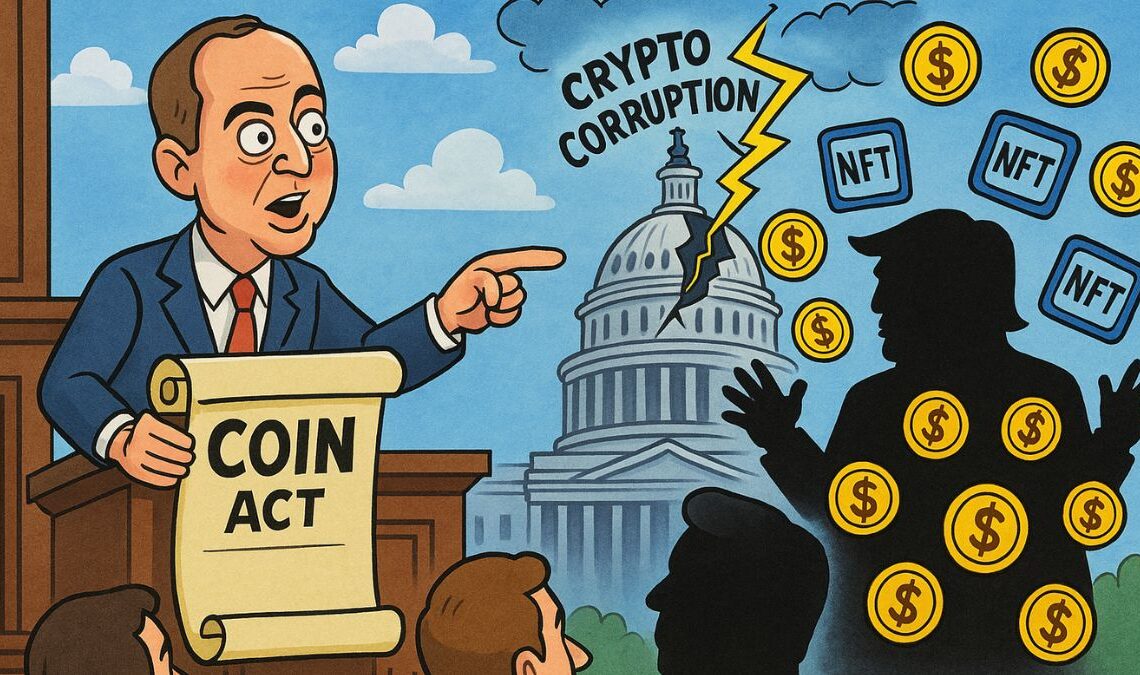The Trump crypto bill, officially named the COIN Act, is now making waves in Washington. Introduced by Senator Adam Schiff, the legislation directly targets former President Donald Trump and other senior officials allegedly involved in crypto-related schemes.
This proposed bill aims to bring more transparency to the intersection of politics and digital assets by enforcing stricter disclosure and ethics rules. As cryptocurrency increasingly influences U.S. politics, Schiff’s move highlights growing concerns over how digital tokens are used by public figures for personal enrichment.
Inside the COIN Act: A Push for Transparency
The COIN Act—short for Crypto-Asset National Security, Transparency, and Oversight—seeks to establish clear boundaries for crypto ownership and promotion among federal officials. The bill mandates that all executive branch personnel must disclose their holdings of digital assets, including NFTs and meme coins, and prohibits them from using their official positions to promote any crypto ventures.
Schiff explained that the legislation was triggered by examples of officials personally profiting from digital assets while in office, citing Trump’s high-profile NFT launches as a key reason.
“Donald Trump and other senior administration officials have made a fortune off of crypto schemes,” Schiff posted in a tweet. “Today, I’m introducing the COIN Act to put a stop to this corruption in plain sight.”
Donald Trump and other senior administration officials have made a fortune off of crypto schemes.
— Adam Schiff (@SenAdamSchiff) June 23, 2025
Today, I'm introducing the COIN Act to put a stop to this corruption in plain sight. pic.twitter.com/8wieNSCPgC
The tweet went viral, surpassing 200,000 views in just a few hours. The full bill text is now available via the official PDF publication on Schiff’s website, alongside a press release outlining its intent.
Trump’s NFT Projects Raise Ethical Questions
Trump has previously launched several digital collections, including “Trump Digital Trading Cards,” which generated millions in revenue. These NFTs were promoted across social media and sparked debates about whether public figures should be allowed to profit from speculative digital assets while pursuing political office.
Schiff’s bill attempts to regulate this gray area. It frames such promotions not only as potential conflicts of interest, but also as threats to public trust in federal institutions.
For context, Trump has already made headlines for embracing crypto more broadly. Earlier this year, he advocated for stablecoin adoption through the so-called Genius Act, and even appeared at the Coinbase Crypto Conference, fueling both interest and controversy.
What the Trump Crypto Bill Could Mean for the Industry
While the bill faces likely resistance in the Senate, its implications are significant. It sends a message that lawmakers are no longer ignoring the convergence of digital assets and political power. The Trump crypto bill may also serve as a blueprint for future legislation aiming to limit crypto-fueled influence in government.
Whether or not the COIN Act passes, it opens the door for deeper scrutiny of crypto activity among politicians. For the broader industry, this moment reflects a shift in how regulation and reputational risk are converging—and how crypto is no longer just a tech issue, but a political one.










